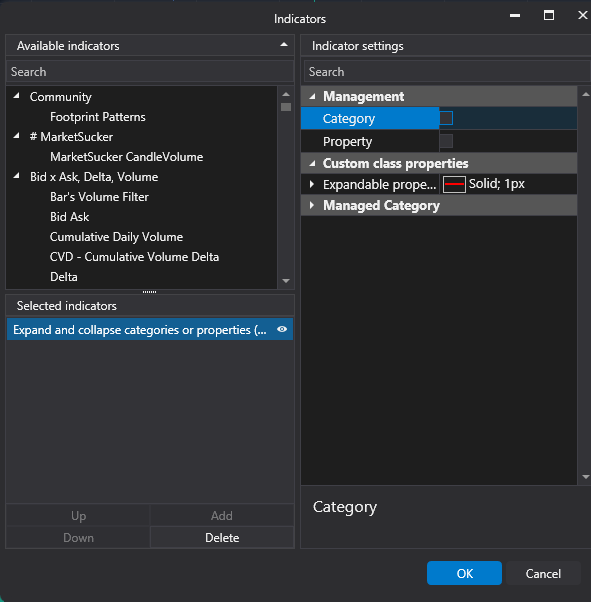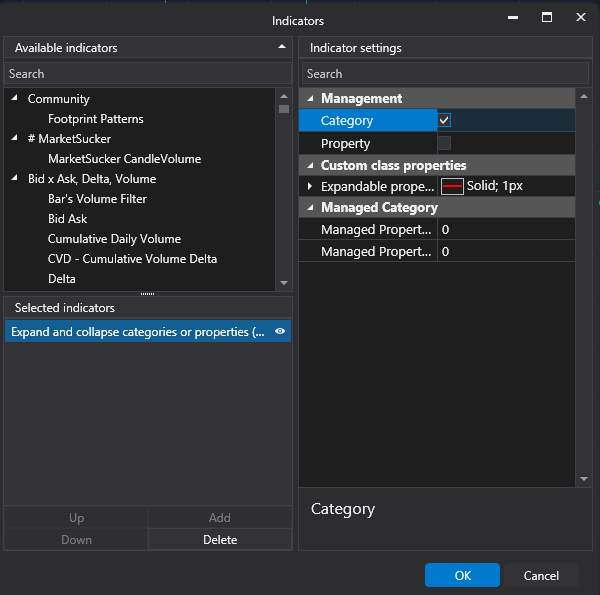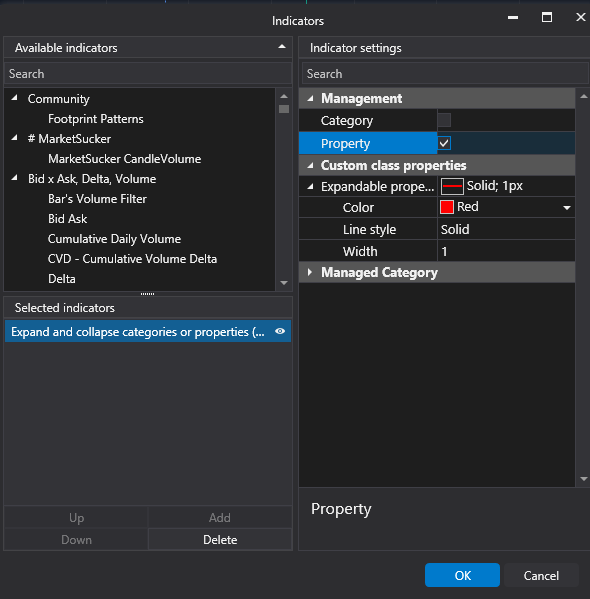This indicator is intended to demonstrate how you can control the collapse and expansion of categories and properties to provide the user with a flexible and convenient interface for managing objects.
Main functions:
- Category management: The
CategoryManager property controls the collapse/expand state for the category named Managed category.
- Property management: The
PropertyManager property controls the collapse/expand state of the ExpandableProperty property, which is represented by the PenSettings type.
Main properties:
CategoryManager - controls whether the Managed category is expanded in the editor.PropertyManager - controls whether the ExpandableProperty is expanded in the editor.ExpandableProperty - managed property.ManagedProperty1 and ManagedProperty2 - properties belonging to the Managed category.
Steps to create an indicator:
- Inherit your indicator from the Indicator class and implement the IPropertiesEditorOwner interface so that your indicator can interact with the property editor:
using OFT.Rendering.Settings;
using System.ComponentModel;
using System.ComponentModel.DataAnnotations;
using System.Drawing;
[DisplayName("Expand and collapse categories or properties")]
{
}
Base class for custom indicators.
Definition Indicator.cs:43
Definition IPropertiesEditorOwner.cs:4
Definition FeatureId.cs:2
- Define private fields to store the state of categories and properties, and to work with the property editor object:
private bool _categoryManager;
private bool _propertyManager;
Definition IPropertiesEditor.cs:8
- Add public properties for grouping and display in the property editor:
[Display(Name = "Category", GroupName = "Management")]
public bool CategoryManager
{
get => _categoryManager;
set => SetProperty(ref _categoryManager, value, () => _propertiesEditor?.SetIsExpandedCategory(_managedCategoryCategoryName, value));
}
[Display(Name = "Property", GroupName = "Management")]
public bool PropertyManager
{
get => _propertyManager;
set => SetProperty(ref _propertyManager, value, () => _propertiesEditor?.SetIsExpandedProperty(nameof(ExpandableProperty), value));
}
Use SetProperty to notify about changes and perform specific actions when a property's state changes.
- In this example, using the
CategoryManager property, we will manage a group of properties such as ManagedProperty1 and ManagedProperty2, and using the PropertyManager property, we will manage the ExpandableProperty property of the PenSettings type, which has several properties for configuration.
[Display(Name = "Expandable property", GroupName = "Custom class properties")]
public PenSettings ExpandableProperty { get; set; } = new();
[Display(Name = "Managed Property 1", GroupName = _managedCategoryCategoryName)]
public int ManagedProperty1 { get; set; }
[Display(Name = "Managed Property 2", GroupName = _managedCategoryCategoryName)]
public int ManagetProperty2 { get; set; }
[Browsable(false)]
{
get => _propertiesEditor;
set
{
if (_propertiesEditor == value)
return;
_propertiesEditor = value;
PropertiesEditorOnChanged(value);
}
}
- Implement the
PropertiesEditorOnChanged method, which will update the state of the property editor when it changes:
{
}
void SetIsExpandedCategory(string? categoryName, bool isExpanded)
void SetIsExpandedProperty(string? propertyName, bool isExpanded)
Categories and properties are managed in this method between calls to the BeginInit and EndInit editor methods.
To manage categories, we call the SetIsExpandedCategory editor method and pass the name of the managed category as the first argument and the CategoryManager control property as the second argument. To manage a property, we call the SetIsExpandedProperty editor method and pass the name of the managed property as the first argument and the PropertyManager control property as the second argument.
This is how our indicator settings window will look when the managed group and property are collapsed:

Group and property are collapsed
If you check the Category property, the Managed category group will expand.

The group has been expanded
If you check the Property property, the Expandable property will expand and you will have access to its properties, such as Color, Line style, Width.

The property has been expanded
Below is the complete code for this indicator:
using OFT.Rendering.Settings;
using System.ComponentModel;
using System.ComponentModel.DataAnnotations;
using System.Drawing;
[DisplayName("Expand and collapse categories or properties")]
{
#region Fields
private const string _managedCategoryCategoryName = "Managed category";
private bool _categoryManager;
private bool _propertyManager;
#endregion
#region Properties
[Display(Name = "Category", GroupName = "Management")]
public bool CategoryManager
{
get => _categoryManager;
set => SetProperty(ref _categoryManager, value, () => _propertiesEditor?.SetIsExpandedCategory(_managedCategoryCategoryName, value));
}
[Display(Name = "Property", GroupName = "Management")]
public bool PropertyManager
{
get => _propertyManager;
set => SetProperty(ref _propertyManager, value, () => _propertiesEditor?.SetIsExpandedProperty(nameof(ExpandableProperty), value));
}
[Display(Name = "Expandable property", GroupName = "Custom class properties")]
public PenSettings ExpandableProperty { get; set; } = new();
[Display(Name = "Managed Property 1", GroupName = _managedCategoryCategoryName)]
public int ManagedProperty1 { get; set; }
[Display(Name = "Managed Property 2", GroupName = _managedCategoryCategoryName)]
public int ManagetProperty2 { get; set; }
#endregion
#region ctor
public ExpandAndCollapseCategoriesOrPropertiesIndicator() : base(true)
{
DenyToChangePanel = true;
DataSeries[0].IsHidden = true;
ExpandableProperty.Color = Color.Red.Convert();
}
#endregion
#region Protected methods
protected override void OnCalculate(int bar, decimal value)
{
}
#endregion
#region Implementation of IPropertiesEditorOwner
[Browsable(false)]
{
get => _propertiesEditor;
set
{
if (_propertiesEditor == value)
return;
_propertiesEditor = value;
PropertiesEditorOnChanged(value);
}
}
{
}
#endregion
}


